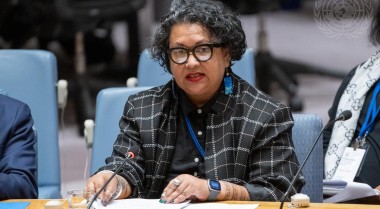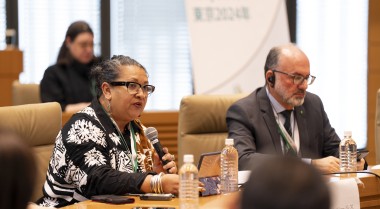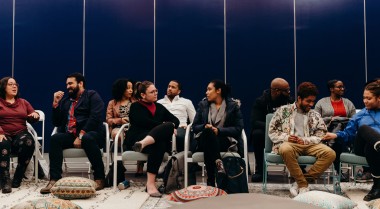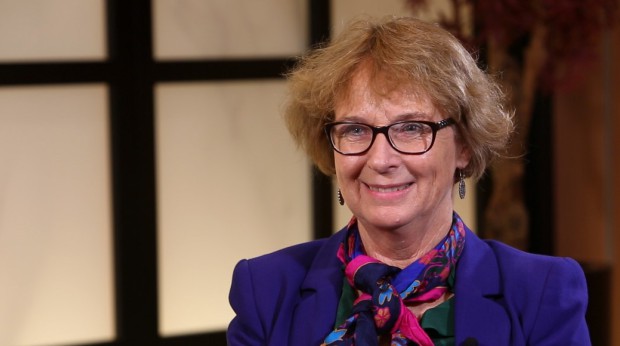
Statement: United Nations Security Council Open Debate on The Role of Young Persons in Addressing Security Challenges in the Mediterranean
On 17 April 2024, Sarra Messaoudi delivered the following statement on behalf of GPPAC member the MENA Coalition on Youth, Peace and Security to the UN Security Council ministerial-level debate on "the role of young persons in addressing security challenges in the Mediterranean.''
Thank you, Mister President.
We thank the Permanent Mission of Malta for the invitation and for including our voices in the conversation.
Excellencies and all allies in the struggle for a more just and peaceful world,
Al Salam Alaykom!
Martin Luther King once said, "True Peace is not merely the absence of tension; it is the presence of justice."
My name is Sarra Messaoudi, and I am in front of you today not just as a young peacebuilder but as a proud Tunisian Mediterranean and Arab woman who belongs to a bold youth community called the MENA Coalition on Youth, Peace, and Security hosted by Justice Call. As a Coalition, we unite fierce youth advocates that promote just peace and challenge the dominant narratives of youth in our region.
Getting here today wasn't easy, including the visa that I was lucky to receive just 3 hours prior to my travel, but it is all worth it because one of the core principles of our work is identity and representation.
As young people from the Mediterranean region, we know where we come from - a region that has and is still transforming the present history. A region with over 60 million young people aged between 15-29 years old, a youth population that deserves a future free from injustices, violence, and instability.
As I stand here delivering these words, over 40,000 Palestinian youth, children, men, and women have either been killed or are buried under the rubble. These people had lives, stories, and dreams, and they were not just numbers! Allah Yarhamhom
As young people, we are exhausted. Enough is enough. It is time that we all address generational wars, conflicts, and insecurity in the region together, not only for our present time but for generations to come.
In persistent challenges in the Mediterranean region, we see space for creativity, resilience, and sustaining peace. Among many, we outline five key challenges:
First, our civic space is under attack with increasing protection needs. That is why young people are coming together collectively as movements, networks, and coalitions, creating platforms to connect, share resources, and collaborate and, most importantly, to provide a safe space for solidarity and support.
Members of the Security Council can take action to encourage and collaborate on equal terms with such structures to support our diverse expertise in a safe and secure manner.
Second, we face systematic barriers to meaningful engagement and participation in politics, peace, and security processes.
Young people in the region are challenging the status quo and are rejecting engagements that do not adhere to YPS principles based on authentic, intentional, and equal partnership.
Young people are not adopting an "us vs them" mindset. We advocate for an intergenerational and multi-stakeholder partnership. Let us be part of the system so we all can contribute better and co-lead together.
In this regard, the Guidance Note on Intergenerational Dialogue, developed by SDI and FBA with input from the MENA Coalition on YPS, is a resource for the Council to consider.
Our recommendations are:
- The Council must openly debate the UN Secretary-General Report on YPS every two years.
- Further, the YPS Agenda must be integrated into all areas of work of the Council.
- Members of this Council can similarly consider establishing an informal Security Council expert group on Youth, Peace, and Security to support these efforts and connect young people to the work of the Council.
Third, the mobility challenge in the region prevents young people from reaching their full potential. The challenge is two-fold:
On one side, young people face severe travel requirements to get visas and permits that prevent them from engaging at the global and regional levels.
In response, they are harnessing the power of technology and social media to advance peace. They are creating digital communities that are borderless, fearless, collaborative, and breakthrough!
On the other side, discriminatory laws and agreements continue to harm migrants' rights in the Mediterranean. People who have to cross the deadliest migration route in the whole world lack adequate social support systems.
We want the Mediterranean to be a sea of hope and opportunities for youth in the region to connect and learn with their peers across the shores of the Sea, fostering genuine exchanges and creating prosperity.
A sea where migration policies are based on respect for human rights and human dignity. We want the Mediterranean Sea to be a Sea of Peace, not a Sea of Death!
Fourth, as young people, we recognise the urgent need to address climate-sensitive security risks, especially with the rising temperatures and floods that we just witnessed in the Mediterranean in 2023.
Addressing climate security takes a uniquely complex turn when it comes to the Arab Mediterranean region. In Palestine, for example, the struggle lies in saving what’s left of the agricultural land from the grid of the illegal settlements.
That is why young peacebuilders in Palestine are working to reconnect Palestinian farmers with their land by organising "alternative tours" and employing non-violent resistance techniques, hoping that their collective efforts will one day be the reason for at least 1sq meter to be returned to their farmers.
The Council should provide normative guidance for climate-sensitive security risks, including attention to the specifics of the Arab Mediterranean region.
The fifth pressing issue is financing for prevention and peacebuilding. Preference is given to humanitarian action with little investment in prevention efforts and peacebuilding. Prevention is one of the five pillars of YPS, which we cannot ignore!
There are limited budgets for causes important to young people, and they continue to struggle with heavy and complex funding mechanisms, checklists, and reporting.
Young people are exploring innovative ways to finance their efforts, such as private-sector investment and community philanthropy. Here, I would like to highlight the work on Investing and Partnering with Youth for Peace, led by Dag Hammarskjöld Foundation, UNICEF, and Justice Call, making a case for why the private sector should invest in YPS.
We recommend that Member States organise a high-level Security Council meeting to renew political and financial commitment to the YPS Agenda and to launch the process for the second progress study on YPS with concrete and time-bounded proposals and actions.
Ladies and gentlemen,
What young people in the Mediterranean are facing today is a heavy burden on our shoulders. The present injustices will leave a lasting mark on our collective consciousness.
Young people are questioning the international system, international law, and the veto powers.
We're questioning why governments choose to invest in wars and weapons that kill innocent civilians instead of investing in truly locally-led efforts that respond to community needs.
Also questioning the imposition of peace agreements we didn't shape and that fail to meet our expectations. Just weeks ago, the Council passed Resolution 2728 for an immediate Gaza ceasefire, a promise of safety for millions. Yet, it seems this resolution was ignored.
A key message from young people in the region is that this Council needs to walk the talk and move from resolutions to accountability and real implementation.
In this battle, we need joint efforts, not siloed approaches.
Your Excellencies, we all have different roles to play in the peace and security ecosystem. It is not only for the Member States to wear the diplomat hats or for us as civil society to wear the hats of implementers! In the YPS work, we need the conveners, the weavers, the mobilisers, the drivers, the storytellers, the supporters! All of these roles are important and complementary.
Finally, one last message I would like to end with:
Today, young people build peace by joining the decolonisation movements and, advocating for decolonising aid, peacebuilding approaches, and shifting the power to locally-led efforts.
Young peacebuilders can no longer be labelled as "too radical" or "too activist."
Liberation, freedom, dignity, and human rights, this is the peacebuilding language that speaks to us.
13 years ago, during the Arab Spring, there was a huge human rights movement across the region calling for peace, dignity and freedom. We are ready to build and sustain a just peace movement because, for us, the revolution didn’t end, but it continues in many forms!
Your excellencies,
All of you in this room were young people working hard to make a difference and leave a print. Let us all not lose this spark because something we all have in common is that we are all believers in a better tomorrow.
During these hard times, we should maintain solidarity and joint action because none of us are free until all of us are free!
Chokran. I Thank You!
UN Photo/Evan Schneider



